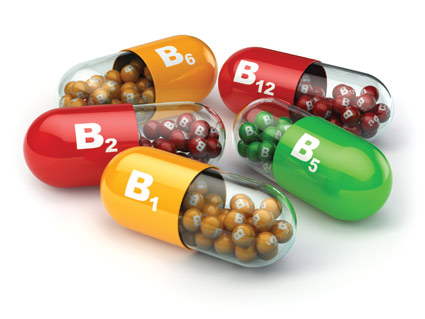
By Jonathan Evans
Herbal Information Specialist for the Herbarium
This month we will start our vitamin tour by looking at the B complex. Many people will come to the shop and want just vitamin B-1 or B-6, or B-12. The problem is that when you take just a single B-vitamin, you are depleting your body of the others. In essence you are trying to run a six-cylinder car on one cylinder. Instead of the single vitamin approach, it’s a good suggestion to take a base complex, and then add a particular B, if needed.
The B family
B vitamins are water soluble, and very important to counteract the effects of stress on the nervous system The government’s recommended intake levels for B vitamins are very low. That’s because these Daily Recommendations are based on the absolute minimum of a nutrient to maintain cell function. Take a look at the standard vitamin at the store and note how much the listed “100 percent of the value” for a given vitamin or mineral actually measures. I realize 100 percent sounds like it should be enough, and people worry about a toxic dose of any given vitamin, but hear me out. (As an example of getting a toxic dose of B-1, you would have to take 125 mg per kilogram of weight. For a 165 lb person that equals 9,375 mgs. We are only taking 50-100 mg for the whole person. I would not worry about getting a toxic dose using a supplement delivering 50-100 mgs.)
As my wife Kathy Duffy, LPN, CCAP/I, MH, and I have said for decades on radio, at public talks and here in this column, I do not live in a minimum world.
For stress, and more
Stress is everywhere, and how we react to it plays a large role in how we exist in the world. Anxiety and depression are conditions that seem to be overwhelming in numbers and nature. Prescription drugs and our supplement sales for these conditions are alarmingly high. We regularly see people who should be taking 50-100 mgs of a B-Complex, or more to cope with the stresses of everyday life. (Read the back label - Each of the Bs should be at LEAST 50 mgs).
Many individuals have been able to reduce or get off their medications by increasing their B complex vitamins. That all being said, the B complex is also very useful for other conditions.
So keeping in mind that all the Bs are for nerve function and stress reduction, the following is a summary of some other uses for the various members of the B family.
All B vitamins are water soluble.
*Note: B-12 is usually admin-istered in an injection at your doctor’s office. The only other best way to get your B-12 is in a sublingual or lozenge form. B-12 does very poorly through the digestive system, so if you have been taking capsules, you probably are getting only a fraction of the vitamin.
Still to come: our vitamin tour discussion of vitamins D,E,F & K.
— Jonathan
Send questions on botanical remedies to: Natures Rx: Jonathan Evans at herbarium258@gmail.com, or by regular mail to: The Herbarium, 264 Exchange St., Chicopee, MA 01013. If requesting additional info, include a self-addressed stamped envelope.
*Article Sources: FDA Vitamin/Mineral chart, VitaChart, Carolyn H. West, Simplified Guide to Nutritional Supplements, Ziff & Ziff.